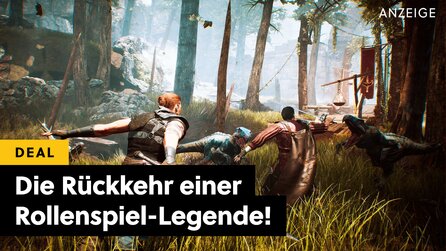What are the details of your job at Wolfenstein II? Do you design all the details for the story, even the ones, the player will never see, or do you focus on the main story line?
Both, actually. I work on the main story together with our Creative Director Jens Matthies, mapping out the narrative framework of the game, writing backstories for all of the characters and developing each character's story arc, writing the cutscenes and in-game events of the game. I also work on the in-game fiction that players can read, like newspaper articles or letters as well as in-game conversations between characters that you can overhear.
How important is narrative design in a game that centers around a lone hero shooting his way to the final boss?
It depends on the kind of game you want to make, but for us it's incredibly important to make not just incredible gameplay, but also to make the player's care for the reason why they are shooting their way to the final boss. Narrative design is also about making the world that the player is inhabiting come alive and feel like it expands beyond the confines of each individual level and this is even more important when the game is set in an alternate 1960's that has changed dramatically from what actually happened.
What's the most fascinating thing in creating villains like Frau Engel, Bubi or Deathshead?
Well, for Frau Engel and Deathshead it's fascinating to explore people who have such grandiose views of themselves. They actually believe that they are on the right side, and that they can do whatever they want to achieve their goals. It's such a perverted mentality that is definitely interesting to explore. Even more interesting is to bring out the human aspects of such characters, to make them something more real than just evil monsters. I think when you approach them from that aspect while writing them, you can create something that means more than villains who are just evil for the sake of being evil.
How do you consider the normal soldier's life in the new world order? Are these guys villains or do some of them just follow orders?
Well, the standard soldiers that you are fighting in New Colossus as well as in New Order are actually soldiers who bought the Regime's ideology wholesale so they are not just following orders, but are actually devoted to the Regime's cause. There may be others working for the Regime who are just following orders elsewhere in the world, but you actually engage with those.
How much fun is it to create the fictional regime's propaganda like "Blitzmensch" or "German or Else"? What's the most interesting aspect of these clips for you?
The TV shows like "Blitzmensch" and "Liesel" contribute a lot to illustrate the kind of subversion of American pop culture that the Regime has been using to indoctrinate ordinary Americans. This kind of fusion between 60's pop culture and the oppressive propaganda of the Regime is one of the things that make the world of Wolfenstein so unique and interesting. Superficially it's not that far from how the actual ads and shows of the 60's were, but underneath all the gloss and glamour hides this horrifying machinery of thought manipulation and subjugation that makes it all much more threatening and terrifying.












Nur angemeldete Benutzer können kommentieren und bewerten.
Dein Kommentar wurde nicht gespeichert. Dies kann folgende Ursachen haben:
1. Der Kommentar ist länger als 4000 Zeichen.
2. Du hast versucht, einen Kommentar innerhalb der 10-Sekunden-Schreibsperre zu senden.
3. Dein Kommentar wurde als Spam identifiziert. Bitte beachte unsere Richtlinien zum Erstellen von Kommentaren.
4. Du verfügst nicht über die nötigen Schreibrechte bzw. wurdest gebannt.
Bei Fragen oder Problemen nutze bitte das Kontakt-Formular.
Nur angemeldete Benutzer können kommentieren und bewerten.
Nur angemeldete Plus-Mitglieder können Plus-Inhalte kommentieren und bewerten.